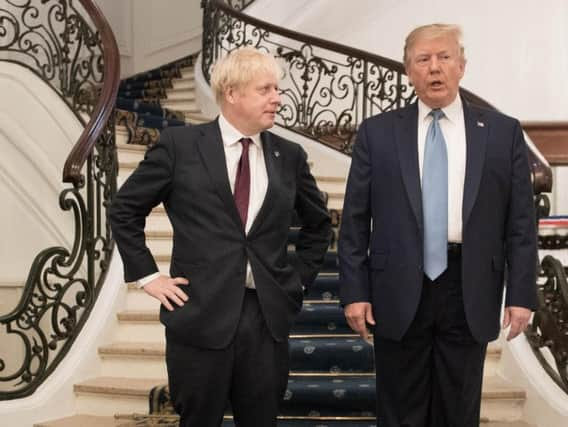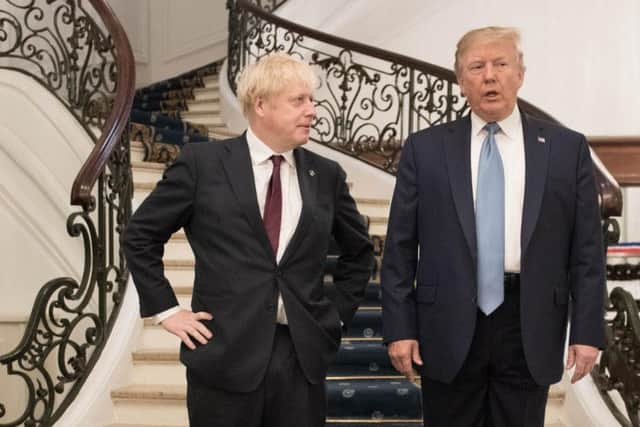Boris Johnson warns Donald Trump that trade war could spark recession


The Prime Minister said the US president was “gung-ho” about the prospect of a “very big trade deal” between the two countries after they had their first formal meeting while attending the G7 summit in Biarritz.
But while Mr Trump gave Mr Johnson his full backing as the new Prime Minister, declaring him “the right man for the job”, Mr Johnson sounded a warning about America’s escalating trade war with China.


Advertisement
Hide AdAdvertisement
Hide AdEconomists have already raised fears that the global economy is heading for recession due to a combination of the slowdown in the US economy as a result of the president’s tariffs on imports, a shrinking of the German economy, China’s debt crisis and a potential no-deal Brexit.
The president has also blamed China for undercutting US goods with an undervalued currency, and moved from just imposing import tariffs on steel to a wide range of Chinese goods.
Yesterday Mr Johnson said Mr Trump risked being blamed for a global recession if he continued his trade war with China and said it was “not the way to proceed”.
He said: “Apart from anything else, those who support the tariffs are at risk of incurring the blame for the downturn in the global economy irrespective of whether or not that is true.
“We [the UK] face tariffs of altogether £2.25 billion – that’s the value of the goods affected, £1.1 billion on whisky alone – that we could face if this goes on. This is not the way to proceed.”
He called on Mr Trump to move towards an “opening up of global trade,” and said, “I want to see a dialling down of tensions and I want to see tariffs come off. We are in favour of trade peace on the whole.”
Shadow international trade secretary Barry Gardiner agreed with the Prime Minister that a global recession was “much more likely” due to Mr Trump’s policies.
“With what Donald Trump has done in introducing the new tariffs that he has suggested on China and the retaliatory tariffs that China is now putting on American goods, we are facing a global recession.” He added a deepening recession was “much more likely if they pursue protectionist and aggressive trade policies”.
Advertisement
Hide AdAdvertisement
Hide AdHowever, President Trump denied that he was coming under pressure from other world leaders to back down in his trade war with China, saying “nobody would tell me that”.”He added that “I think they respect the trade war.”
After talks between Mr Johnson and Mr Trump, the Prime Minister said a new working group had been established to focus on closer economic links, but admitted that he wanted a series of concessions from Washington, and that there would be “tough talks ahead”.
“There’s an opportunity to do a great free trade deal with the United States, he said. “The president is very gung-ho about that and so am I.”
But he added that “I don’t think people realise quite how protectionist” the US market can be. “They want to do it within a year, I’d love to do it within a year, but that’s a very fast timetable,”
He also urged the president to drop restrictions on UK goods entering American markets, including shower trays, wallpaper, pillows, railway carriages and even cauliflowers and pork pies.
“It’s not just beef or lamb that is currently banned from entering the US, in spite of their commitment to overturn that prohibition in 2014,” Mr Johnson said. “Melton Mowbray pork pies, which are sold in Thailand and in Iceland, are currently unable to enter the US market because of some sort of Food and Drug Administration restriction.”
He added that cauliflowers “can only enter specified ports not including Miami, which is where UK exporters want them.”
“I know that there will be some tough talks ahead because at the moment I don’t think we sell a single joint of British lamb in the United States; we don’t sell any beef.... and there are huge opportunities for the UK to penetrate the American market in ways we currently don’t.”
Advertisement
Hide AdAdvertisement
Hide AdAsked if he had made clear his views on protecting the NHS and animal welfare standards in trade talks with Mr Trump, the Prime Minister said: “There is complete unanimity on that point.”
Mr Trump said he wanted a deal done “quickly” because in the past he had been “stymied” under Theresa May. He added: “This is a different person and this is a person that’s going to be a great Prime Minister, in my opinion.”
He said the US and UK were “going to do a very big trade deal, bigger than we’ve ever had with the UK and now at some point they won’t have the obstacle, they won’t have the anchor around their ankle, because that’s what they have.”
But Mr Johnson told Mr Trump: “Talking of the anchor, Donald, what we want is for our ships to take freight, say, from New York to Boston, which for the moment they’re not able to do.”
US director of the National Economic Council Larry Kudlow and UK Cabinet Secretary Sir Mark Sedwill have now been directed to set up a special relationship economic working group (SREWG).
“The SREWG will develop market-oriented principles for economic growth and increase bilateral co-operation on issues related to the modern 21st-century economy,” the White House and Number 10 said in a joint statement.
The statement said that during the talks in Biarritz the two leaders discussed how Brexit presented opportunities for “deepening our already robust economic and commercial relationship, including a comprehensive trade agreement”.